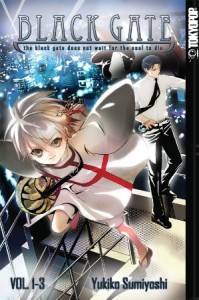Senju is a “Mitedamashi,” an agent with the power to summon or seal Gates, and save people’s souls. He is a guardian to Hijiri, a boy whose life he once saved. After Hijiri discovers his own hidden powers, he begins a journey of self-discovery where the distant past comes back to haunt him and his choices determine life and death, not only for those he cares about, but the whole world!
 By Yukiko Sumiyoshi
By Yukiko Sumiyoshi
Publisher: Tokyopop
Age Rating: Teen
Genre: Fantasy
Price: $19.99
Rating: 3 out of 5 stars
When I got Black Gate, I didn’t know anything about it other than it was a series about the supernatural, so it was an easy book to put off. But seeing it take up the space of three potential volumes, I decided to dust it off and see if it deserved that bookshelf space. While it’s not a bad series, it does take some turns, especially that the end that doesn’t make it deserving to remain on my limited bookshelf.
This series is about Hijiri, the son and last living Gate Keeper, a person born with the ability to open or close the gates that draw people’s souls out of this world and into another. His family was killed on the same day he was born, and he has been raised by Senju, a Mitedamashi, a person with the power to see these gates, and is tasked with closing the Black Gates, gates that take souls forcefully rather than waiting for the person to die. The first volume is all about the world building and introducing Hijiri and guardian Senju. The second volume follows Hijiri as he attempts to make a life for himself as a Mitedamashi, and the friends he makes along the way. The third volume has Hijiri confronting his past and facing his destiny.
I didn’t like Hijiri or Senju right off the bat. Hijiri was a brat, intent on doing whatever he wanted, and Senju was a jerk right back to him. Hijiri does mature some mentally, if not physically, as the story goes on. Of much more interest to me where Tsurugi, and Michitate, cousins who belong to a group tasked with protecting the Gate Keepers, as well as Michitate’s half-brother Michizane, a Mitedamashi that Hijiri wants as his partner. Tsuguri is the happy-go-lucky type that hides a tragic past, and Michitate is the quiet, serious type who hates Michizane, who is the loner type. While rather stereotypical, they were more interesting than Hijiri’s big talk and Senju’s weighted guilt.
The title itself is about death and how people deal with it. The whole tragedy of Hijiri and the end of the Gate Keepers begins with the desire of normal humans to have the gates closed permanently, so there is no more death. Throughout the story, there are examples of fear of death, and dealing the loss of a loved one, and how the promise of returning them to life can turn friend into foe. While the presentation of these ideas were mildly interesting, I didn’t like answers that came from them, especially for Hijiri. What Hiriji believed was right, but caved in the end. And Senju, for all the death he caused in the name of revenge, certainly didn’t deserve the second chance he got. Hijiri would have been better off with his real friends, who we see drift away with time.
Black Gate had potential, but it got lost somewhere along the way. While there were moments that I liked, mostly in the first volume, the ending trumped any of these good moments by giving a happy ending to the most undeserving. I don’t think it’s message was a good one. We should do all we can to keep our loved ones alive, but not at the cost of someone else, and we should learn when to let go. This title didn’t do that, as a result committed a real injustice to its readers.